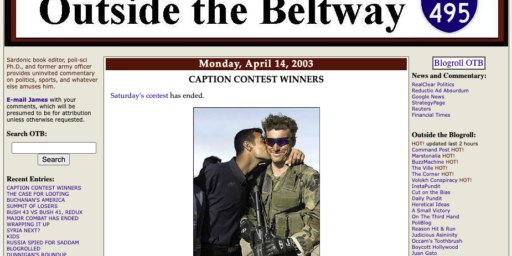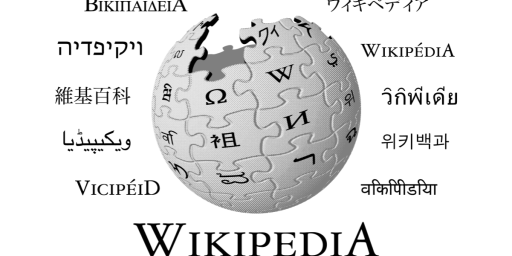Internet Pseudonymity Redux
Tom Grubisich, a former WaPo editor and reporter who now writes for Online Journalism Review, laments that discussions on online forums like blog and newspaper comments sections are coarsened by the calling of vile names, hate-mongering, and other activity enabled by anonymity. He argues that we would not take people appearing at town hall meetings very seriously were they to show up with paper bags over their heads, so why should the Internet be any different?
He proposes that site owners require detailed registration, including obtaining and verifying phone numbers, to force commenters to be more responsible. He would allow for pseudonymity only for whistle blowers and other special cases where there the need to protect privacy outweighs consideration of civility. Even there, though, the site owner should know and verify the poster’s identity but pledge to shield it.
The quasi-pseudonymous* Big Tent Democrat thinks this a “laughably stupid” scheme of “a person who simply does not understand the way blogging works.”
He observes that, “Pseudonymity allows real people to post their thoughts without fear of real world repercussions” and reasonably points out that people might have legitimate concerns as to whether site owners would keep their information confidential. Further, he argues that site hosts can take care of profanity, personal attacks, and otherwise enforce their standards of civility through comment moderation.
Indeed, that’s what I do at OTB. Several of my regular commenters are pseudonymous for various reasons and yet manage to engage in thoughtful discussions.
Still, Grubisich’s premise is not absurd. Writing under one’s own name does tend to have a moderating effect on one’s discourse and anonymity does free people from the “real world repercussions” of bad behavior. It also masks potential conflicts of interest and hidden agendas.
At the same time, many people, including serving military, intelligence, or diplomatic officers, are not free to express political views under their own name. People work under supervisors who have radically different ideologies than their own. Firms that must constantly recruit new clients often have strong restrictions on employee self-expression under the not-unreasonable assumption that allowing free reign might alienate potential business partners. Writing under a name that is obviously female or Asian or Hispanic or Muslim may well yield vitriolic ad hominem responses that limit one’s ability to engage in rational discussion.
So, while Grubish’s concerns are reasonable, his solution would likely hinder informed discussion more than it would help. To the extent that Internet discussion forums can be vitriol-free zones (or, indeed, depending on one’s tastes, to which that is desirable) it’s likely to be accomplished by diligent moderation and a thoughtful user community that refuses to feed the trolls.
Unfortunately, online boorishness is as hard to defeat as an insurgency, for many of the same reasons. Building up is much harder than tearing down and repairing damage is harder than inflicting it. And the time and effort required to moderate comments often lead to sites either shutting down comments altogether or giving up and allowing anarchy.
*He’s not trying much harder to hide his real identity now than when he was blogging under a previous pseudonym.






The blogosphere is powerful evidence that anonymity encourages some people to display the worst human intellectual traits.
The Federalist Papers, published pseudonymously, are powerful evidence that anonymity encourages some people to display the best human intellectual traits.
I don’t know what to conclude.
BTD is correct; Grubisch doesn’t grasp the basic concept of what he’s talking about. Anonymity/pseudonymity allows people to post their honest thoughts, without fear of repercussions. What Grubisch fails to grasp is that some people simply have greedy, corrupt, obscene, puerile thoughts – attempting to filter “the wrong people” out of Internet discussions fatally drops the entire concept. He just wants people to be a little more civil? Well f*ck off, Grubisch – some people don’t want to be civil.
Here’s one of his big talking points:
Maybe he would; but he’d still be allowed to speak. After that, if his speech was obscene or disingenuous, people (like Grubisch) could choose to ignore him. But what Grubisch is proposing is, as near as I can tell, to pre-select people who care enough to express themselves in a way he doesn’t find offensive.
Again, I say: f*ck off.
(Asterisks provided both for convenience and irony)
Rules, credentials, what next?
I post using my real name and hope it adds a measure of legitimacy to what I say but I certainly don’t begrudge those who don’t. They have their reasons.
I’m not sure I agree with this. These pseudonymites are the lowest degenerates known to man!
Requiring people to blog under their own names is not really different than requiring them to have their name and address posted on the back of their shirt and the bumper of their car.
Yeah maybe it would make things a tad bit more polite, it’d also go a long ways towards empowering the small percentage of the populous that is down right wacko. Who here hasn;t seen threats of physical violence up to and including rape and murder made online? Those threats when made against an anonymous poster are simply a sad reflection of how pathetic the person posting the threats is. When made against a person using their actual identity then they become something a lot more dangerous. They become possible.
James:
I do not know why you chose to take a false cheap shot at me in this discussion.
For the record, I did try to not make my real identity known to causal users, in the past. I did NOT disclose my identity in my posts and trusted in the online ethic of NOT outing.
I can see now that you never accepted that ethic. More shame to you.
Today, at TalkLeft, I have full disclosure of my identity. I use a handle but who I am is fully disclosed.
That you do not see the difference between the two is your problem, not mine.
Is it lack of intellignece or honesty that leads you to write what you did?
Armando,
The above wasn’t intended as a shot at you but an acknowledgment that your real-life identity was widely known. See here, for example. I purposely did not link that or otherwise make direct reference to your identity beyond the oblique footnote.
The post is a 95% defense of your position, merely expressing that there was some merit to the claim that anonymity has negative consequences, too.
Indeed, the sentence “Firms that must constantly recruit new clients often have strong restrictions on employee self-expression under the not-unreasonable assumption that allowing free reign might alienate potential business partners” was another oblique reference to you and others in a similar situation and, again, a defense, not an attack.